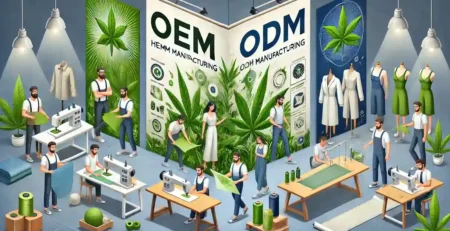
13
Mar
Custom Packaging and Labeling: Enhancing Brand Identity Through OEM Partnerships
In today’s competitive market, brand identity plays a crucial role in attracting customers and building trust. One of the most effective ways for textile brands to stand out is through custom packaging and labeling. Well-designed customized textile packaging solutions not only enhance the unboxing experience but also communicate a brand’s values, sustainability efforts, and premium quality.
Partnering with OEM (Original Equipment Manufacturer) service providers for custom packaging and labeling services for textiles allows brands to create unique, high-quality packaging without investing in their own production facilities. These partnerships help textile businesses streamline branding, reduce costs, and improve customer perception.
Why Custom Packaging and Labeling Matter in the Textile Industry
1. Strengthening Brand Identity
Packaging is the first interaction a customer has with a product. A well-designed package and label:
✔ Reinforce brand recognition through logos, colors, and design.
✔ Convey brand values such as sustainability, luxury, or affordability.
✔ Differentiate a brand from competitors in a crowded market.
For example, premium clothing brands use minimalist, eco-friendly packaging to showcase their commitment to sustainability. Meanwhile, high-fashion labels opt for luxurious, embossed packaging to enhance exclusivity.
2. Enhancing the Customer Experience
Custom packaging transforms the unboxing experience, creating a sense of excitement and exclusivity. A branded package with premium textures, custom inserts, and elegant wrapping makes customers feel valued, increasing brand loyalty.
Brands using customized textile packaging solutions can include:
✔ Personalized thank-you cards inside the package.
✔ Branded tissue paper or fabric wraps for an elegant touch.
✔ Reusable packaging, aligning with sustainability trends.
3. Promoting Sustainability and Eco-Friendliness
Consumers today prefer brands that prioritize sustainability. Using biodegradable, recyclable, or reusable packaging materials can:
✔ Reduce plastic waste and carbon footprint.
✔ Align the brand with eco-conscious consumers.
✔ Enhance a company’s reputation for corporate responsibility.
For instance, eco-conscious textile brands collaborate with custom packaging and labeling services for textiles to create recyclable garment bags, compostable labels, and organic cotton drawstring pouches.
4. Increasing Perceived Value
High-quality customized textile packaging solutions elevate a brand’s perceived value. When a product arrives in premium packaging with elegant typography and rich textures, customers associate it with luxury and exclusivity.
For example, high-end fashion brands use:
✔ Magnetic rigid boxes with gold foil logos for limited-edition collections.
✔ Premium fabric pouches for luxury scarves and accessories.
✔ Embossed leather tags and customized ribbons for high-end appeal.
5. Ensuring Product Protection
Packaging also serves a functional purpose by protecting textiles during shipping and storage. Durable, moisture-resistant packaging prevents damage and ensures that customers receive products in perfect condition.
Custom packaging and labeling services for textiles offer solutions such as:
✔ Waterproof mailers to protect delicate fabrics.
✔ Anti-dust garment bags for premium clothing.
✔ Reinforced cardboard boxes for high-value textile products.
The Role of OEM Partnerships in Custom Packaging and Labeling
What Are OEM Partnerships?
OEM (Original Equipment Manufacturer) partnerships allow brands to outsource production to specialized manufacturers. Instead of investing in in-house production, brands can collaborate with experienced OEM service providers for:
✔ Custom textile packaging solutions
✔ Branded labeling, tags, and inserts
✔ Sustainable and premium packaging materials
By partnering with OEM providers, textile brands can focus on design, marketing, and sales, while the manufacturer handles high-quality production at scale.
Benefits of Custom Packaging and Labeling Through OEM Partnerships
1. Cost-Effective Production
OEM manufacturers produce customized textile packaging solutions at a lower cost due to bulk production capabilities and established supply chains. This allows brands to:
✔ Reduce packaging and labeling costs.
✔ Scale up production without infrastructure investment.
✔ Access affordable, high-quality materials.
2. High-Quality Customization Options
OEM packaging providers offer advanced customization for textile brands, including:
✔ Custom-printed tissue paper and boxes.
✔ Luxury foiling, embossing, and debossing.
✔ Sustainable packaging made from hemp, recycled paper, or organic fabrics.
3. Faster Time-to-Market
Working with an experienced OEM partner speeds up the production process, ensuring that:
✔ Packaging and labeling are completed on time.
✔ Brands meet launch deadlines efficiently.
✔ Supply chains remain streamlined and hassle-free.
4. Sustainable and Ethical Packaging Solutions
OEM manufacturers increasingly focus on eco-friendly packaging, offering:
✔ Compostable garment bags made from cornstarch.
✔ Reusable tote bags and fabric wraps.
✔ Soy-based ink for eco-friendly printing.
For brands looking to appeal to eco-conscious consumers, collaborating with an OEM for sustainable packaging is a strategic advantage.
5. Custom Branding with Private Label Solutions
Many OEM providers offer private-label services, allowing textile brands to sell products under their own branding while the manufacturer handles production.
✔ Branded woven labels for high-end fashion.
✔ Custom hangtags with eco-friendly messaging.
✔ Luxury packaging inserts with personalized branding.
This strengthens brand identity while ensuring cost-effective and high-quality production.
Popular Customized Textile Packaging Solutions
1. Sustainable Fabric Bags & Pouches
✔ Ideal for premium apparel, scarves, and accessories.
✔ Made from organic cotton, hemp, or jute.
✔ Reusable and environmentally friendly.
2. Branded Luxury Boxes
✔ Perfect for designer clothing, suits, and exclusive fashion collections.
✔ Can include magnetic closures, foil stamping, and UV printing.
3. Recyclable and Biodegradable Mailers
✔ Used for e-commerce clothing shipments.
✔ Reduces plastic waste while offering stylish branding.
4. Woven and Embroidered Labels
✔ Custom high-quality branding for fashion labels.
✔ Enhances premium textile products.
5. Custom Hangtags and Inserts
✔ Provides product care instructions and brand storytelling.
✔ Includes QR codes for digital engagement.
How to Choose the Right OEM Partner for Custom Packaging and Labeling
1. Check for Customization Capabilities
✔ Ensure the OEM offers custom printing, branding, and premium materials.
2. Look for Sustainability Certifications
✔ Partner with eco-friendly manufacturers using recyclable and biodegradable materials.
3. Request Samples
✔ Test materials, finishing quality, and durability before placing bulk orders.
4. Verify Production Capacity & Lead Times
✔ Ensure the manufacturer can meet your demand and delivery schedules.
5. Evaluate Cost & MOQ (Minimum Order Quantity)
✔ Compare pricing and MOQ to balance quality with affordability.
FAQs About Custom Packaging and Labeling Through OEM Partnerships
1.Why is custom packaging important for textile brands?
Custom packaging enhances brand identity, customer experience, and sustainability while protecting products.
2.What are the benefits of OEM packaging partnerships?
✔ Lower costs
✔ High-quality materials
✔ Faster production
✔ Scalability
3.Can I get sustainable packaging from OEM providers?
Yes! Many OEM partners offer biodegradable, recycled, and compostable packaging options.
4.What customization options are available for textile packaging?
✔ Custom logos, labels, tissue paper, boxes, and hangtags.
5.What is the MOQ for custom packaging?
MOQs vary but typically range from 500-5,000 pieces, depending on customization.
6.Can I add QR codes to my packaging?
Yes! QR codes on tags and inserts help brands engage customers digitally.
7.How long does it take to produce custom packaging?
Lead times vary but typically range from 3-8 weeks.
8.What are the best materials for sustainable packaging?
✔ Organic cotton
✔ Recycled paper
✔ Compostable mailers
9.Can I order custom labeling separately from packaging?
Yes! Many OEMs offer individual label production services.
10.Where can I find OEM custom packaging and labeling services for textiles?
Look for certified manufacturers specializing in customized textile packaging solutions.
Custom packaging and labeling are essential tools for enhancing brand identity, improving customer experience, and promoting sustainability. By partnering with OEM providers, textile brands can access cost-effective, high-quality, and customizable packaging solutions to elevate their brand presence.


